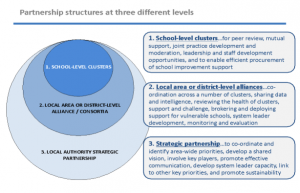By Simon Day, Director of the Isos Partnership. Posted 13th May 2022
According to analysis by the Institute for Government, 41% of England’s population now live in areas (including Greater London) with some form of mayoral devolution deal.
The Government’s Levelling Up White Paper further confirmed the importance of Combined Authorities in the Government’s plans for continued devolution. Of the three proposed tiers within the Government’s new devolution framework, Mayoral Combined Authorities (MCAs) will be offered the greatest devolution of powers and funding, with new ‘trailblazer deals’ in Greater Manchester and the West Midlands to test further streamlining of central government funding streams for MCAs.
Although education has featured in a number of devolution deals, to date there hasn’t been a significant focus on how best Combined Authorities might use their devolved powers to support new locality models of joint working with schools and trusts.
Through the LocalED pilot, we are keen to explore what role Combined Authorities might play specifically in relation to school improvement working across their constituent local authorities.
What are we seeking to test?
Combined Authorities were one potential model of locally led place-based partnerships identified by the original 2021 research Developing a New Locality Model for English Schools.
They were seen by the research to operate at a scale across multiple local authorities, which may give them additional advantages over other local place-based models that we are keen to test further through this pilot.
These potential advantages include:
- Operating on a size and scale which should make it easier to identify and share good practice across a greater number of schools and trusts
- Offering potential efficiencies and economies of scale to be achieved by operating across a larger locality footprint
- Providing links to the wider responsibilities held by Combined Authorities in relation to skills and economic development which should be informing priorities for schools.
In addition to testing some of these potential advantages, we are also keen to test whether the role played by Combined Authorities in relation to school improvement mirrors that played by existing local education partnerships or whether there are differences in the roles and functions undertaken by different partners when operating at a larger scale.
There is already an emerging evidence base about the role local authorities and local education partnerships are playing in relation to school improvement. Our own research for the Local Government Association published in 2017 identified nine conditions needed to develop effective local school improvement systems (see reference 1).
Christine Gilbert, LocalED Adviser, identified a similar set of characteristics in her 2017 study of local education partnerships (see reference 2). In that research, she identified the detailed role local education partnerships are playing in supporting the school improvement process in the following areas:
- Intelligence gathering and identification of need
- The brokerage of support from a range of different partners
- Development and improvement work
- Evaluation of impact feeding back into the identification of needs
We are keen to explore what opportunities and challenges exist for Combined Authorities in relation to each of these stages of the school improvement process during the pilots.
Our LGA research also identified differences in the roles and functions played at different levels of local school systems as shown in the diagram below.

We are keen to test and explore what this looks like when operating across a Combined Authority area and whether operating at a larger scale changes what level different activities take place at, including what specific functions are undertaken by the Combined Authority itself.
What are we going to be doing next?
We are delighted to be working with North Tyne Combined Authority through this pilot, who have already demonstrated their commitment to education through an investment of over £1.8 million in their own Education Improvement and Child Poverty Prevention pilots. As part of their work to date they have already developed a Joint School Improvement Strategy which identifies common priorities across all three local education authorities.
We are meeting with the Combined Authority and Education Directors from the three local authorities on the 16th June to discuss further their aims and objectives for this pilot.
We hope that the learning we develop through working with North Tyne, will be useful to other Combined Authorities and local areas in developing their own approach to implementing locality-based approaches to school improvement.
We will continue to share regular updates and learning from our work. Please contact info@localed2025.org.uk you would like any more information.
Reference 1: ENABLING SCHOOL IMPROVEMENT: Research into the role of local authorities in supporting local school improvement systems Local Government Association 2017 (Ben Bryant, Simon Day, Simon Rea, Kate Wilson)
Reference 2: Gilbert, C. (2017). Optimism of the will: the development of local area-based education partnerships. London: London Centre for Leadership in Learning. Available at: http://www.lcll.org.uk/publications.html



